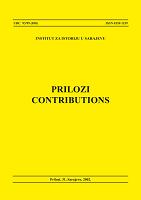BiH u raspravama i odlukama Drugog zasjedanja AVNOJ-a
Bosnia and Herzegovina in the Discussions and Decisions of the AVNOJ Second Session
Author(s): Safet BandžovićSubject(s): History
Published by: Institut za istoriju
Keywords: Bosnia and Herzegovina; World War II; AVNOJ; Antifascit Liberation Council of Yugoslavia
Summary/Abstract: The specificity of the “Avnoj federative formula”, (AVNOJ, Antifascit Liberation Council of Yugoslavia), the formation of the Yugoslav federation is seen from the fact prior to that, in 1943 the federative state was created, in the course of 1944 the members of the federation, when the antifascit councils of the countries at the second sessions became the highest legal and representative bodies of their federal units. The AVNOJ decisions, the “partisan parliament” were within a frame and principle character. The Yugoslav federation was established, the shapes of some federal units concerning the boarder were not completed, also the permament positionof some areas, the members of the union structure, as unitary or complex. At the mentioned AVNOJ session the idea of the Bosniaks to be a nation was refused. The republican status of B-H at the Second AVNOJ session was not decided. As M. Djilas wrote, it was decided only after the session: “It happened during the march, after the withdrawal from Jajce, early January 1944. Ranković informed that the Bosnian leadership suggests a republic and Tito agreed, later all of them as well as something being acceptable for itself”. The communist authorities did not succeed to solve the national question in Yugoslavia completely after 1945, but rearanging the country on the federative basis the acceptable solutions for the multi-ethnic country were possible.
Journal: Prilozi
- Issue Year: 2002
- Issue No: 31
- Page Range: 179-204
- Page Count: 26
- Language: Bosnian

